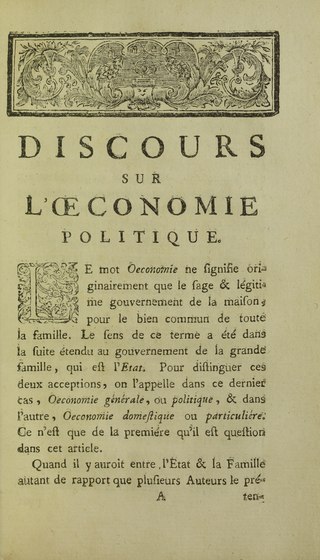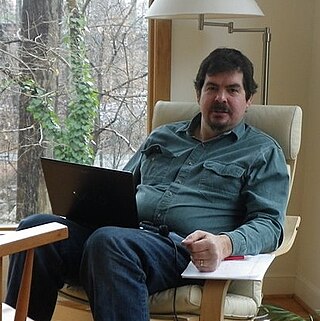Related Research Articles
Econometrics is an application of statistical methods to economic data in order to give empirical content to economic relationships. More precisely, it is "the quantitative analysis of actual economic phenomena based on the concurrent development of theory and observation, related by appropriate methods of inference." An introductory economics textbook describes econometrics as allowing economists "to sift through mountains of data to extract simple relationships." Jan Tinbergen is one of the two founding fathers of econometrics. The other, Ragnar Frisch, also coined the term in the sense in which it is used today.

Political economy is a branch of political science and economics studying economic systems and their governance by political systems. Widely studied phenomena within the discipline are systems such as labour markets and financial markets, as well as phenomena such as growth, distribution, inequality, and trade, and how these are shaped by institutions, laws, and government policy. Originating in the 16th century, it is the precursor to the modern discipline of economics. Political economy in its modern form is considered an interdisciplinary field, drawing on theory from both political science and modern economics.
In economics, industrial organization is a field that builds on the theory of the firm by examining the structure of firms and markets. Industrial organization adds real-world complications to the perfectly competitive model, complications such as transaction costs, limited information, and barriers to entry of new firms that may be associated with imperfect competition. It analyzes determinants of firm and market organization and behavior on a continuum between competition and monopoly, including from government actions.

Vernon Lomax Smith is an American economist and professor of business economics and law at Chapman University. He was formerly a professor of economics at the University of Arizona, professor of economics and law at George Mason University, and a board member of the Mercatus Center. Along with Daniel Kahneman, Smith shared the 2002 Nobel Memorial Prize in Economic Sciences for his contributions to behavioral economics and his work in the field of experimental economics. He worked to establish 'laboratory experiments as a tool in empirical economic analysis, especially in the study of alternative market mechanisms'.
Monetary economics is the branch of economics that studies the different theories of money: it provides a framework for analyzing money and considers its functions, and it considers how money can gain acceptance purely because of its convenience as a public good. The discipline has historically prefigured, and remains integrally linked to, macroeconomics. This branch also examines the effects of monetary systems, including regulation of money and associated financial institutions and international aspects.
Experimental economics is the application of experimental methods to study economic questions. Data collected in experiments are used to estimate effect size, test the validity of economic theories, and illuminate market mechanisms. Economic experiments usually use cash to motivate subjects, in order to mimic real-world incentives. Experiments are used to help understand how and why markets and other exchange systems function as they do. Experimental economics have also expanded to understand institutions and the law.
Computational economics is an interdisciplinary research discipline that involves combines methods in computational science and economics to solve complex economic problems. This subject encompasses computational modeling of economic systems. Some of these areas are unique, while others established areas of economics by allowing robust data analytics and solutions of problems that would be arduous to research without computers and associated numerical methods.
Philosophy and economics studies topics such as public economics, behavioural economics, rationality, justice, history of economic thought, rational choice, the appraisal of economic outcomes, institutions and processes, the status of highly idealized economic models, the ontology of economic phenomena and the possibilities of acquiring knowledge of them.
Leontief's paradox in economics is that a country with a higher capital per worker has a lower capital/labor ratio in exports than in imports.
A Bachelor of Economics is an academic degree awarded to students who have completed undergraduate studies in economics. Specialized economics degrees are also offered as a "tagged" BA (Econ), BS (Econ) / BSc (Econ), BCom (Econ), and BSocSc (Econ), or variants such as the "Bachelor of Economic Science".
Economic methodology is the study of methods, especially the scientific method, in relation to economics, including principles underlying economic reasoning. In contemporary English, 'methodology' may reference theoretical or systematic aspects of a method. Philosophy and economics also takes up methodology at the intersection of the two subjects.
Mathematical economics is the application of mathematical methods to represent theories and analyze problems in economics. Often, these applied methods are beyond simple geometry, and may include differential and integral calculus, difference and differential equations, matrix algebra, mathematical programming, or other computational methods. Proponents of this approach claim that it allows the formulation of theoretical relationships with rigor, generality, and simplicity.
Robert Wayne Clower was an American economist. He is credited with having largely created the field of stock-flow analysis in economics and with seminal works on the micro-foundations of monetary theory and macroeconomics.
The methodology of econometrics is the study of the range of differing approaches to undertaking econometric analysis.
Manuel Arellano is a Spanish economist specialising in econometrics and empirical microeconomics. Together with Stephen Bond, he developed the Arellano–Bond estimator, a widely used GMM estimator for panel data. This estimator is based on the earlier article by Arellano's PhD supervisor, John Denis Sargan, and Alok Bhargava. RePEc lists the paper about the Arellano-Bond estimator as the most cited article in economics.
Anil K. Bera is an Indian-American econometrician. He is Professor of Economics at University of Illinois at Urbana–Champaign's Department of Economics. He is most noted for his work with Carlos Jarque on the Jarque–Bera test.
There have been many criticisms of econometrics' usefulness as a discipline and perceived widespread methodological shortcomings in econometric modelling practices.

John Philip Rust is an American economist and econometrician. John Rust received his PhD from MIT in 1983 and taught at the University of Wisconsin, Yale University and University of Maryland before joining Georgetown University in 2012. John Rust was awarded Frisch Medal in 1992 and became the fellow of Econometric Society in 1993.
In economics, the credibility revolution was the movement towards improved reliability in empirical economics through a focus on the quality of research design and the use of more experimental and quasi experimental methods. Developing in the 1990s and early 2000s, this movement was aided by advances in theoretical econometric understanding, but was especially driven by research studies that focused on the use of clean and credible research designs.
Philip A. Haile is an economist and the Ford Foundation Professor of Economics at Yale University.
References
- ↑ "About Us | UCLA Anderson School of Management". www.anderson.ucla.edu. Retrieved 2020-07-24.
- ↑ Edward E. Leamer Home Page and CV Archived 2015-04-02 at the Wayback Machine
- ↑ Leamer, Edward E. (1983). "Let's Take the Con Out of Econometrics". The American Economic Review. 73 (1): 31–43. ISSN 0002-8282. JSTOR 1803924.
- ↑ "Edward Leamer Deserves a Nobel Prize for Improving Argumentation That Uses Statistics · Econ Journal Watch : Sensitivity analysis, econometrics, specification search, data mining, natural experiments, replication, statistical inference". econjwatch.org. Retrieved 2021-02-04.
- ↑ "Leamer". 15 June 2021.
- ↑ "Leamer". 15 June 2021.
- ↑ "Leamer". 15 June 2021.